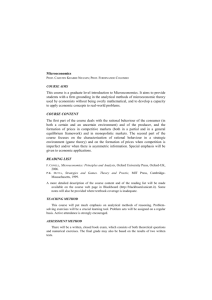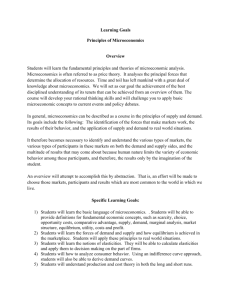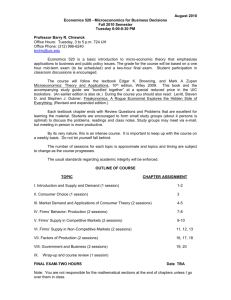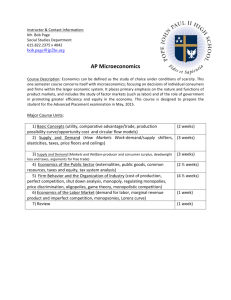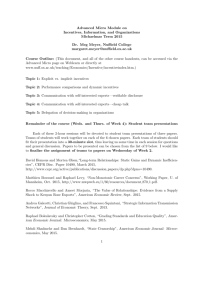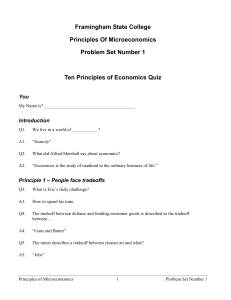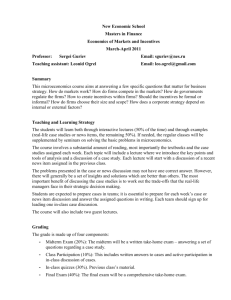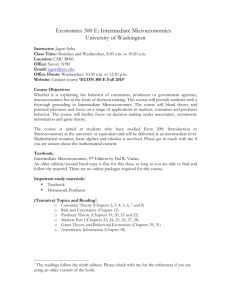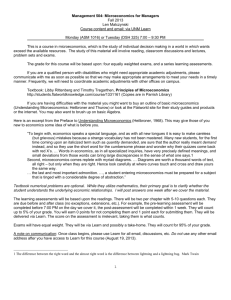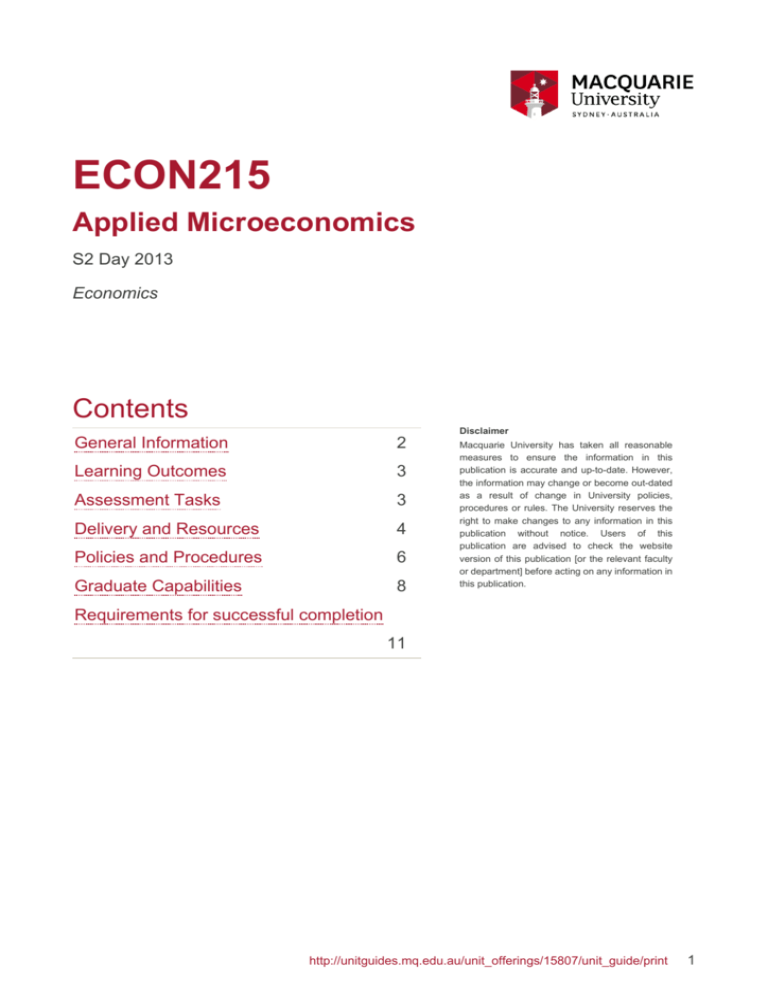
ECON215
Applied Microeconomics
S2 Day 2013
Economics
Contents
General Information
2
Learning Outcomes
3
Assessment Tasks
3
Delivery and Resources
4
Policies and Procedures
6
Graduate Capabilities
8
Disclaimer
Macquarie University has taken all reasonable
measures to ensure the information in this
publication is accurate and up-to-date. However,
the information may change or become out-dated
as a result of change in University policies,
procedures or rules. The University reserves the
right to make changes to any information in this
publication without notice. Users of this
publication are advised to check the website
version of this publication [or the relevant faculty
or department] before acting on any information in
this publication.
Requirements for successful completion
11
http://unitguides.mq.edu.au/unit_offerings/15807/unit_guide/print
1
Unit guide ECON215 Applied Microeconomics
General Information
Unit convenor and teaching staff
Unit Convenor
Wylie Bradford
wylie.bradford@mq.edu.au
Contact via wylie.bradford@mq.edu.au
E4A425
Tutor
Ryan Esplin
ryan.esplin@mq.edu.au
Contact via ryan.esplin@mq.edu.au
Credit points
3
Prerequisites
15cp and (ECON111 or BBA103)
Corequisites
Co-badged status
Co-badged with BBA204
Unit description
This unit, as the name suggests, is about the application of microeconomic theory. We
introduce students to the ways in which individuals, businesses and governments use the
analytical tools of microeconomics to decipher contemporary global issues, with a particular
focus on new and interesting applications as well as new ways of looking at traditional
applications. The aim of the course is not to be mathematically rigorous or theoretically
thorough. Instead, your main objective is an appreciation of how fundamental and evolving
models can help us understand issues of our contemporary world, or in other words, how to
view the world through an economic lens. Tools and concepts (such as supply and demand,
choices and incentives, market failure, externalities, games and strategies, and behavioural
economics) may be used to analyse issues of environmental damage and economic
prosperity, money and happiness, cash versus gifts, art and the artist, market domination by
the big brands, social networks, and more. The unit will be interesting to students with
economic majors as well as students with non-economic majors; the topics add depth and
texture to traditional introductory economics topics.
http://unitguides.mq.edu.au/unit_offerings/15807/unit_guide/print
2
Unit guide ECON215 Applied Microeconomics
Learning Outcomes
1. Recognise, identify and apply micro-economic theory to different issues
2. Demonstrate an understanding of the incentives that govern the decisions of individuals
in the market place and in an array of simple organisational structures
3. Acquire an appreciation of the importance and effect of incentives on economic
behaviour and outcomes
4. Understand the effect of typical human behaviours on economic outcomes and analysis
Assessment Tasks
Name
Weighting
Due
Test 1
30%
Thursday 12 September
Analytical report
25%
Friday 5 October
Final exam
45%
Formal examination period
Test 1
Due: Thursday 12 September
Weighting: 30%
The mid-session test will be held in Week 7 during the class lecture time. The test will be for two hours, and will cover the first
6 weeks of lecture and tutorial material.
This Assessment Task relates to the following Learning Outcomes:
• Recognise, identify and apply micro-economic theory to different issues
• Demonstrate an understanding of the incentives that govern the decisions of individuals
in the market place and in an array of simple organisational structures
• Acquire an appreciation of the importance and effect of incentives on economic
behaviour and outcomes
Analytical report
Due: Friday 5 October
Weighting: 25%
Details of this assessment task will be provided on iLearn.
The report is to be submitted to Turnitin via iLearn.
http://unitguides.mq.edu.au/unit_offerings/15807/unit_guide/print
3
Unit guide ECON215 Applied Microeconomics
No extensions will be granted. Late essays will be accepted up to 48 hours after the submission deadline, after which a
mark of zero will be awarded. The awarded mark for accepted late submissions will decay exponentially at the rate
of 1.15% per hour after the published deadline. This penalty does not apply for cases in which an application for special
consideration is made and approved.
This Assessment Task relates to the following Learning Outcomes:
• Recognise, identify and apply micro-economic theory to different issues
• Demonstrate an understanding of the incentives that govern the decisions of individuals
in the market place and in an array of simple organisational structures
• Acquire an appreciation of the importance and effect of incentives on economic
behaviour and outcomes
• Understand the effect of typical human behaviours on economic outcomes and analysis
Final exam
Due: Formal examination period
Weighting: 45%
You are expected to present yourself for examination at the time and place designated in the University Examination
Timetable. The timetable will be available in Draft form approximately eight weeks before the commencement of the
examinations and in final form approximately four weeks before the commencement of the examinations. The relevant website
is http://www.timetables.mq.edu.au/exam
This Assessment Task relates to the following Learning Outcomes:
• Recognise, identify and apply micro-economic theory to different issues
• Demonstrate an understanding of the incentives that govern the decisions of individuals
in the market place and in an array of simple organisational structures
• Acquire an appreciation of the importance and effect of incentives on economic
behaviour and outcomes
• Understand the effect of typical human behaviours on economic outcomes and analysis
Delivery and Resources
Learning and teaching strategy
The learning and teaching strategy in ECON215 recognises that students learn from contact with
academic staff and other students. It also recognizes that students must take responsibility for
their learning process, which includes independent study. Moreover, it acknowledges the
importance and acts to promote the academic and personal integrity of students and academic
staff.
Lectures – Large Group Learning
http://unitguides.mq.edu.au/unit_offerings/15807/unit_guide/print
4
Unit guide ECON215 Applied Microeconomics
Lectures are intended to provide an overview of basic microeconomic theory and application.
Tutorials – Small Group Learning
Tutorials constitute an importantl learning experience in this unit and students are expected to
attend. The tutor will facilitate a student-centred discussion of answers to mostly pre-set tutorial
questions and problems. A tutorial is also an active forum to discuss with the tutor and the other
students difficulties you encountered when preparing for the tutorial questions.
Independent Learning – (≈ 7-8 hours per week)
ECON215 relies heavily on independent learning where students read the relevant chapter,
revise the lecture notes, and prepare answers to pre-set tutorial questions.
Classes
Understanding of course content requires that you attend lectures and tutorials and engage in
independent study. The lectures provide a general overview of the topics highlighting the
pertinent concepts and techniques. Tutorials complement lectures by providing opportunities to
further explore material presented in lectures.
There are 3 hours face-to-face teaching per week consisting of:
• one 2 hour lecture, and
• one 1 hour tutorial
The timetable for classes for ECON215 is on the University web site at:
http://www.timetables.mq.edu.au/.
Required and Recommended Texts and/or Materials
There is no set textbook for the course, though you will need access to an introductory or
intermediate textbook on microeconomics. This will assist you to revise some of the basic
concepts in microeconomics.
USEFUL REFERENCES Walter Nicholson & Christopher Snyder, INTERMEDIATE
MICROECONOMICS AND ITS APPLICATION, 11th Edition, South-Western Cengage Learning,
2010. (If you must get a textbook, buy this one).
Jeffrey M. Perloff, MICROECONOMICS, 5th Edition, Pearson Addison-Wesley, 2009. (Good
reference in terms of theory and application but a heavy-weight. Also doubles up as a
paperweight. Choose at own expense!)
Jeff Borland, MICROECONOMICS: CASE STUDIES AND APPLICATIONS, Cengage Learning,
2008. (Purely for the interesting applications).
Unit Web Page
http://unitguides.mq.edu.au/unit_offerings/15807/unit_guide/print
5
Unit guide ECON215 Applied Microeconomics
iLearn is an online program available at http://ilearn.mq.edu.au through which students will be
able to access resources to assist them throughout the semester.
The discussion forum on iLearn can (and should) be utilised to ask academic and administrative
questions (of a non-personal nature). You must regularly visit and use the website to assist with
your learning.
The following information will be available on iLearn:
• List of Topics
• Announcements
• Lecture slides
• ECHO
• Updates & information on
• Staff consultation times and contact
assessments
details
• Discussion forum & news articles
• Tutorial questions and materials
Policies and Procedures
Macquarie University policies and procedures are accessible from Policy Central. Students
should be aware of the following policies in particular with regard to Learning and Teaching:
Academic Honesty Policy http://www.mq.edu.au/policy/docs/academic_honesty/policy.html
Assessment Policy http://www.mq.edu.au/policy/docs/assessment/policy.html
Grading Policy http://www.mq.edu.au/policy/docs/grading/policy.html
Grade Appeal Policy http://www.mq.edu.au/policy/docs/gradeappeal/policy.html
Grievance Management Policy http://mq.edu.au/policy/docs/grievance_management/policy.html
Special Consideration Policy http://www.mq.edu.au/policy/docs/special_consideration/policy.html
In addition, a number of other policies can be found in the Learning and Teaching Category of
Policy Central.
Academic Honesty
The nature of scholarly endeavour, dependent as it is on the work of others, binds all members
of the University community to abide by the principles of academic honesty. Its fundamental
principle is that all staff and students act with integrity in the creation, development, application
and use of ideas and information. This means that:
http://unitguides.mq.edu.au/unit_offerings/15807/unit_guide/print
6
Unit guide ECON215 Applied Microeconomics
• all academic work claimed as original is the work of the author making the claim
• all academic collaborations are acknowledged
• academic work is not falsified in any way
• when the ideas of others are used, these ideas are acknowledged appropriately.
Any student in ECON215 found in breach of the Macquarie University’s Academic Honesty
Policy will be penalized. Penalties include the receipt of a fail grade for the assessment and/or a
fail grade for the course. A breach can also result in expulsion from Macquarie University. Any
student found in breach of this policy will have this recorded on their central file.
Further information on the academic honesty can be found in the Macquarie University Academic
Honesty Policy at http://www.mq.edu.au/policy/docs/academic_honesty/policy.html
Grades
Macquarie University uses the following grades in coursework units of study:
• HD - High Distinction
• D - Distinction
• CR - Credit
• P - Pass
• F - Fail
Grade descriptors and other information concerning grading are contained in the Macquarie
University Grading Policy which is available at:
http://www.mq.edu.au/policy/docs/grading/policy.html
Grading Appeals and Final Examination Script Viewing
If, at the conclusion of the unit, you have performed below expectations, and are considering
lodging an appeal of grade and/or viewing your final exam script please refer to the following
website which provides information about these processes and the cut off dates in the first
instance. Please read the instructions provided concerning what constitutes a valid grounds for
appeal before appealing your grade.
http://www.businessandeconomics.mq.edu.au/new_and_current_students/
undergraduate_current_students/how_do_i/grade_appeals/
Special Consideration Policy
The University is committed to equity and fairness in all aspects of its learning and teaching. In
stating this commitment, the University recognises that there may be circumstances where a
student is prevented by unavoidable disruption from performing in accordance with their ability. A
special consideration policy exists to support students who experience serious and unavoidable
disruption such that they do not reach their usual demonstrated performance level. The policy is
available at:
http://unitguides.mq.edu.au/unit_offerings/15807/unit_guide/print
7
Unit guide ECON215 Applied Microeconomics
http://www.mq.edu.au/policy/docs/special_consideration/policy.html
Special consideration is only available where course work has been satisfactory. For the
purposes of this course satisfactory progress will mean an aggregate performance of at
least 45% in all assessed work prior to any assessment task for which consideration is
claimed. Where consideration is granted, additional assessemnt will be undertaken during
the Supplementary Examination period for Session 2.
Student Support
Macquarie University provides a range of Academic Student Support Services. Details of these
services can be accessed at: http://students.mq.edu.au/support/
UniWISE provides:
• Online learning resources and academic skills workshops
http://www.students.mq.edu.au/support/learning_skills/
• Personal assistance with your learning & study related questions.
• The Learning Help Desk is located in the Library foyer (level 2).
• Online and on-campus orientation events run by Mentors@Macquarie.
Student Enquiry Service
Details of these services can be accessed at http://www.student.mq.edu.au/ses/.
Equity Support
Students with a disability are encouraged to contact the Disability Service who can provide
appropriate help with any issues that arise during their studies.
IT Help
If you wish to receive IT help, we would be glad to assist you at http://informatics.mq.edu.au/
help/.
When using the university's IT, you must adhere to the Acceptable Use Policy. The policy applies
to all who connect to the MQ network including students and it outlines what can be done.
Graduate Capabilities
Creative and Innovative
Our graduates will also be capable of creative thinking and of creating knowledge. They will be
imaginative and open to experience and capable of innovation at work and in the community. We
want them to be engaged in applying their critical, creative thinking.
This graduate capability is supported by:
http://unitguides.mq.edu.au/unit_offerings/15807/unit_guide/print
8
Unit guide ECON215 Applied Microeconomics
Learning outcomes
• Demonstrate an understanding of the incentives that govern the decisions of individuals
in the market place and in an array of simple organisational structures
• Acquire an appreciation of the importance and effect of incentives on economic
behaviour and outcomes
• Understand the effect of typical human behaviours on economic outcomes and analysis
Assessment task
• Analytical report
Discipline Specific Knowledge and Skills
Our graduates will take with them the intellectual development, depth and breadth of knowledge,
scholarly understanding, and specific subject content in their chosen fields to make them
competent and confident in their subject or profession. They will be able to demonstrate, where
relevant, professional technical competence and meet professional standards. They will be able
to articulate the structure of knowledge of their discipline, be able to adapt discipline-specific
knowledge to novel situations, and be able to contribute from their discipline to inter-disciplinary
solutions to problems.
This graduate capability is supported by:
Learning outcomes
• Recognise, identify and apply micro-economic theory to different issues
• Demonstrate an understanding of the incentives that govern the decisions of individuals
in the market place and in an array of simple organisational structures
• Acquire an appreciation of the importance and effect of incentives on economic
behaviour and outcomes
• Understand the effect of typical human behaviours on economic outcomes and analysis
Assessment tasks
• Test 1
• Analytical report
• Final exam
Critical, Analytical and Integrative Thinking
We want our graduates to be capable of reasoning, questioning and analysing, and to integrate
and synthesise learning and knowledge from a range of sources and environments; to be able to
critique constraints, assumptions and limitations; to be able to think independently and
systemically in relation to scholarly activity, in the workplace, and in the world. We want them to
have a level of scientific and information technology literacy.
http://unitguides.mq.edu.au/unit_offerings/15807/unit_guide/print
9
Unit guide ECON215 Applied Microeconomics
This graduate capability is supported by:
Learning outcomes
• Recognise, identify and apply micro-economic theory to different issues
• Demonstrate an understanding of the incentives that govern the decisions of individuals
in the market place and in an array of simple organisational structures
• Acquire an appreciation of the importance and effect of incentives on economic
behaviour and outcomes
• Understand the effect of typical human behaviours on economic outcomes and analysis
Assessment tasks
• Test 1
• Analytical report
• Final exam
Problem Solving and Research Capability
Our graduates should be capable of researching; of analysing, and interpreting and assessing
data and information in various forms; of drawing connections across fields of knowledge; and
they should be able to relate their knowledge to complex situations at work or in the world, in
order to diagnose and solve problems. We want them to have the confidence to take the initiative
in doing so, within an awareness of their own limitations.
This graduate capability is supported by:
Learning outcomes
• Recognise, identify and apply micro-economic theory to different issues
• Demonstrate an understanding of the incentives that govern the decisions of individuals
in the market place and in an array of simple organisational structures
• Acquire an appreciation of the importance and effect of incentives on economic
behaviour and outcomes
• Understand the effect of typical human behaviours on economic outcomes and analysis
Assessment task
• Analytical report
Effective Communication
We want to develop in our students the ability to communicate and convey their views in forms
effective with different audiences. We want our graduates to take with them the capability to
read, listen, question, gather and evaluate information resources in a variety of formats, assess,
write clearly, speak effectively, and to use visual communication and communication
technologies as appropriate.
http://unitguides.mq.edu.au/unit_offerings/15807/unit_guide/print
10
Unit guide ECON215 Applied Microeconomics
This graduate capability is supported by:
Assessment tasks
• Analytical report
• Final exam
Requirements for successful completion
In order to successfully complete ECON215 you must:
• demonstrate mastery of the learning outcomes to an extent sufficient to warrant a
passing grade as per the Grading Policy;
• achieve a result of at least 40% of the combined available marks for the within-session
assessment tasks;
• achieve a result of at least 40% of the available marks for the final examination.
http://unitguides.mq.edu.au/unit_offerings/15807/unit_guide/print
11

